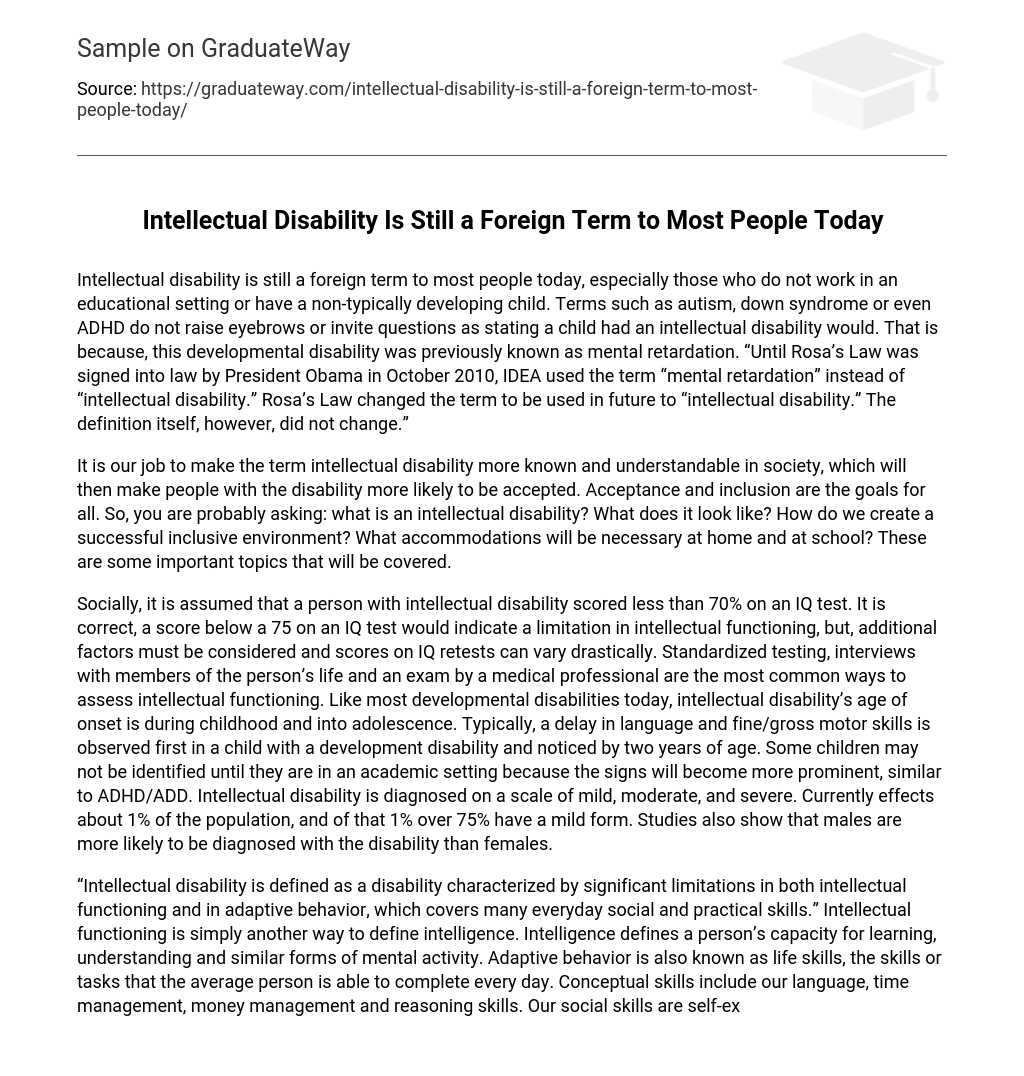Intellectual disability is still a foreign term to most people today, especially those who do not work in an educational setting or have a non-typically developing child. Terms such as autism, down syndrome or even ADHD do not raise eyebrows or invite questions as stating a child had an intellectual disability would. That is because, this developmental disability was previously known as mental retardation. “Until Rosa’s Law was signed into law by President Obama in October 2010, IDEA used the term “mental retardation” instead of “intellectual disability.” Rosa’s Law changed the term to be used in future to “intellectual disability.” The definition itself, however, did not change.”
It is our job to make the term intellectual disability more known and understandable in society, which will then make people with the disability more likely to be accepted. Acceptance and inclusion are the goals for all. So, you are probably asking: what is an intellectual disability? What does it look like? How do we create a successful inclusive environment? What accommodations will be necessary at home and at school? These are some important topics that will be covered.
Socially, it is assumed that a person with intellectual disability scored less than 70% on an IQ test. It is correct, a score below a 75 on an IQ test would indicate a limitation in intellectual functioning, but, additional factors must be considered and scores on IQ retests can vary drastically. Standardized testing, interviews with members of the person’s life and an exam by a medical professional are the most common ways to assess intellectual functioning. Like most developmental disabilities today, intellectual disability’s age of onset is during childhood and into adolescence. Typically, a delay in language and fine/gross motor skills is observed first in a child with a development disability and noticed by two years of age. Some children may not be identified until they are in an academic setting because the signs will become more prominent, similar to ADHD/ADD. Intellectual disability is diagnosed on a scale of mild, moderate, and severe. Currently effects about 1% of the population, and of that 1% over 75% have a mild form. Studies also show that males are more likely to be diagnosed with the disability than females.
“Intellectual disability is defined as a disability characterized by significant limitations in both intellectual functioning and in adaptive behavior, which covers many everyday social and practical skills.” Intellectual functioning is simply another way to define intelligence. Intelligence defines a person’s capacity for learning, understanding and similar forms of mental activity. Adaptive behavior is also known as life skills, the skills or tasks that the average person is able to complete every day. Conceptual skills include our language, time management, money management and reasoning skills. Our social skills are self-explanatory, but also involve self-esteem, problem solving skills, empathy and ability to make and retain friendships. Your ability to organize and complete everyday tasks independently would be your practical skills, such as your personal care, schedules, routines and safety.
“The American Association of Intellectual and Developmental Disabilities (AAIDD) stresses that the main reason for evaluating individuals with intellectual disabilities is to be able to identify and put in place the supports and services that will help them thrive in the community throughout their lives.” (3) Many different types of supports services can provide full inclusion in all aspects of life. Intellectual disability falls under the federal law, Individuals with Disabilities Education Act (IDEA) which will provide support in school during adolescence. In school, children with intellectual disability would have an IEP plan created by a team consisting of their educators, parents and school administrators that would define the students goals, necessary accommodations and support services necessary. Students with intellectual disability should be included in the general education curriculum per inclusion laws. It is important for educators to demonstrate instructions, provide visual cues, break tasks into small steps and give immediate feedback. Students with intellectual disabilities will often need a lot of hands on materials rather than simply hearing or reading lessons or instructions. Promoting independence through life skills and activities of daily living are important. Teaching social skills, awareness and how to participate in group activities is important in the success of these students.
At home, it is important for parents to learn their child, learn their disability, reach out for support and join support groups. Patience is extremely important for any parent but especially those who parents a child with a special need. Encouraging your child and never losing hope is what your child needs. Children with intellectual disabilities should still participate in sports, clubs and social activities. They should still have chores and responsibilities. Along with school; feedback, praise, simple demonstrative instructions, visual aids (such as a visual schedule), and broken-down tasks will promote success in your child.
As we learned today, individuals with Intellectual disability simply need additional support in their intellectual functioning and adaptive behavior. The support necessary is determined by placing the focus on the individual’s strengths. Intellectual disability is a life-long condition, but, a person with intellectual disability can be an independent contributing member of society. Providing lifelong support (not just early intervention) at home, in school, at work and in the community is the key to success and will improve the function and quality of life.





